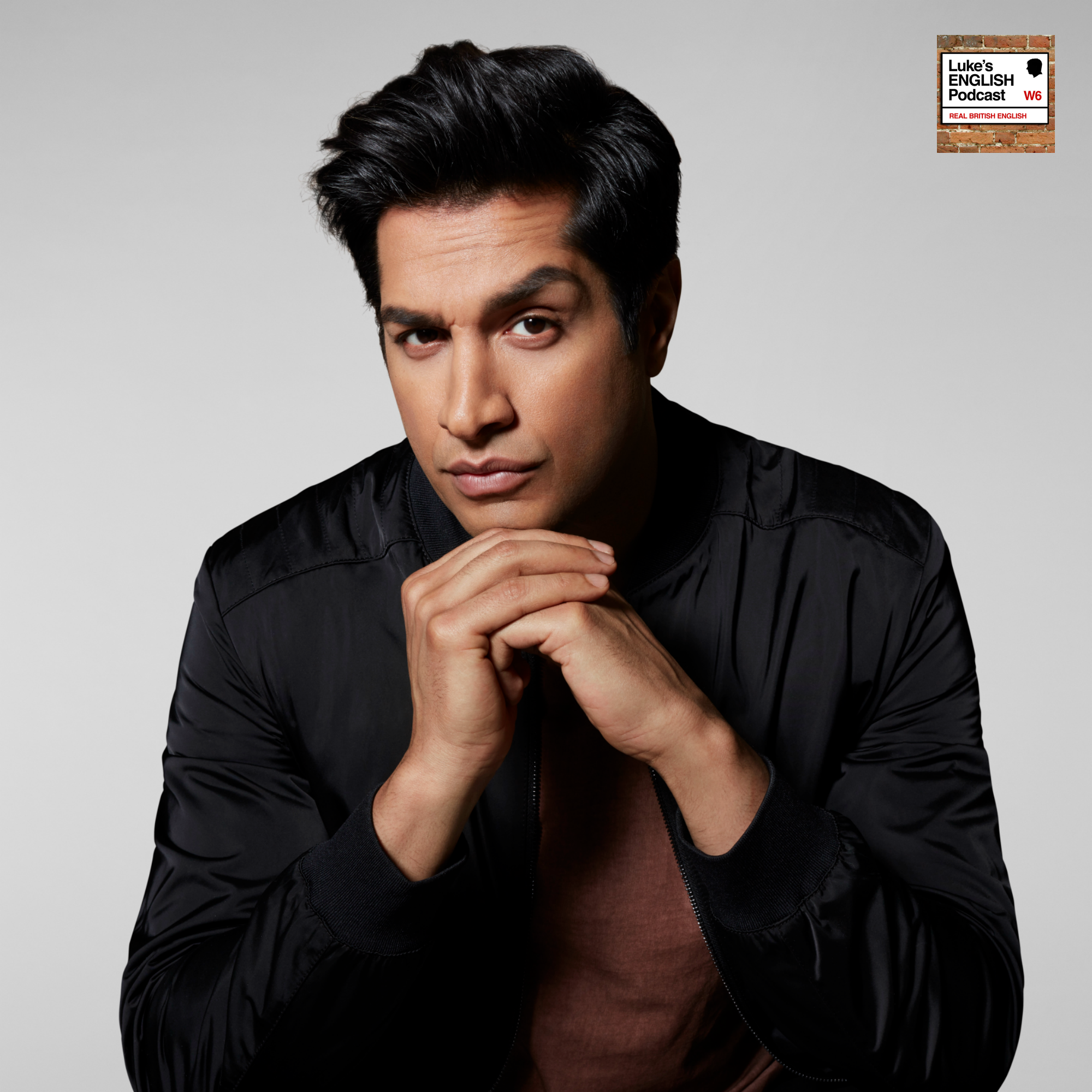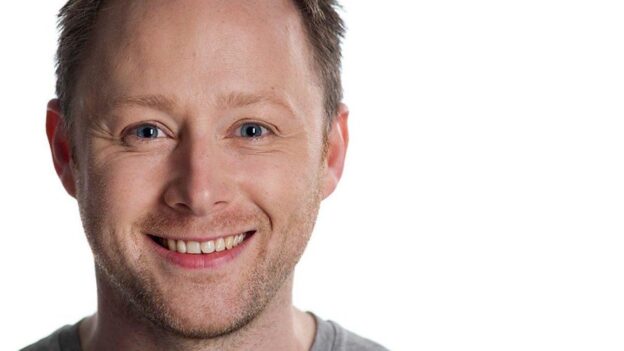Part 2 of my chat with Canadian stand-up comedian Sugar Sammy, talking about his 4 languages, TV shows from our childhood, copying Indian accents, language-related controversy in Quebec, Sammy’s crowd-work skills, stories of difficult gigs in the UK, and our thoughts on recent Star Wars films. At the end of the episode you can hear my spoiler-free review of “Solo: A Star Wars Story”. Transcriptions and notes available.
![]() [DOWNLOAD]
[DOWNLOAD]
Sugarsammy.com – for news of Sammy’s live shows
Introduction Transcript
 Hello, welcome back to the podcast. Here is part 2 of my conversation with Canadian multilingual stand up comedy sensation Sugar Sammy.
Hello, welcome back to the podcast. Here is part 2 of my conversation with Canadian multilingual stand up comedy sensation Sugar Sammy.
In our conversation we’re talking mainly about language and comedy, and here’s an overview of the main points that come up in this episode:
- First of all we talk about the 4 languages that Sammy speaks
There’s a tangent about American TV shows that we both used to watch when we were children, and which actually helped Sammy to learn English when he was young. - Two of those American TV shows we mention include Knight Rider (the one in which David Hasselhoff drives around in a super cool black talking car) and The Dukes of Hazzard (the one about two brothers who live on a farm in Georgia who drive around Georgia in an orange Dodge Charger, being chased by stupid local police officers, doing lots of jumps and stunts in the car).
- We talk about accents and copying accents: Specifically the question of whether I should do an impression of an Indian accent on stage, or if that would be inappropriate or unacceptable for some reason.
- We discuss a language controversy that Sammy was involved in in Quebec, Canada – which included him receiving lots of criticism and even a death threat, essentially for performing a popular show in languages other than French – in Quebec (they are very protective of the French language there) It was quite scandal at the time.
- We talk about what Sammy does on stage, especially his crowd-work, which is that skill of improvising moments of comedy by talking directly to members of the audience. This is something that Sammy is known for because he does it very well.
- Sammy talks about some tough comedy gigs he has had in the UK over the years and tells us a story of how he once got heckled by an aggressive audience in Northern Ireland. Heckling is when audience members shout things at you while you’re performing. For a comedian it can be pretty difficult when you’re being heckled, but good comics are able to react and respond with funny “heckle put downs”, funny responses that turn an aggressive comment into a funny moment.
- Then there’s a bit about Star Wars at the end – because like me, Sammy is a big fan.
We talk briefly about Sammy’s favourite episode of Star Wars, what he thought of The Last Jedi and whether he is interested in seeing the new Han Solo film. When I recorded this interview I hadn’t seen Solo, but since recording it I have, so I will talk about the Han Solo movie briefly at the end of this episode, giving my non-spoiler review.
Don’t forget that Sammy will be touring parts of Asia soon – this year probably. He has gigs coming up in Malaysia and Singapore and will be organising dates in China and Japan. He also intends to visit Russia and South America to do shows at some point. So Sammy might be performing near you soon and you must go and see him. To get news of Sammy’s shows so you don’t miss him – visit sugarsammy.com and join his mailing list.
Now without any further ado, let’s continue listening to my conversation with the super cool multilingual comedian from Canada – Sugar Sammy.
Sugarsammy.com
Knight Rider
The Dukes of Hazzard
Peter Sellers in The Party (an English actor performing as an Indian character – it would be offensive but Seller’s impression is spot on according to Sammy)
Solo: A Star Wars Story (No-Spoiler Review)
Notes & Transcriptions
For those of you who are Star Wars fans – I’m now going to talk about the latest film, which in English is called “SOLO” – released last month.
This is a “star wars story” – not part of the Skywalker narrative.
It’s an origins story.
I was sceptical about the film.
Production for the film seemed troubled, which is usually not a good sign – but it’s not necessarily a guarantee of a bad film.
The original directors were fired by Kathleen Kennedy (head of Lucasfilm) because they took the film in a comedic direction and there was too much improvisation.
Ron Howard was brought in (a more conventional, reliable Hollywood guy) to fix it and bring it back in line.
Also there were doubts about the ability of Alden Ehrenreich to pull off the performance of a character who we loved so much, largely because of Harrison Ford’s star power.
I kept my expectations pretty low. I just thought – I’d like to see what happens, I just want to enter the world of Star Wars again and see what it’s like. I was ready to be disappointed though.
The film has underperformed at the box office. I’m not sure of the exact figures, but it’s taken less than it should have and might be considered as a financial failure, possibly even losing money for the studio in the short to medium term. It’s bound to make money eventually, long term, but the general feel is that it didn’t do as well as the studio hoped. Perhaps we’ve all had enough of Star Wars now. Star Wars fatigue, or maybe the fanbase has gone a bit weird. Star Wars has always been seen as an indestructible franchise. But the Last Jedi divided audiences, with quite a lot of fans absolutely hating it. Maybe Solo has suffered from the so-called Star Wars backlash.
But Solo isn’t really like The Last Jedi. It doesn’t have the same subtext of progressive politics, or themes that seem to subvert the core ideas of Star Wars. It’s pretty conventional and straightforward stuff.
What I liked
- The performance by Alden Ehrenreich. He was charismatic, swashbuckling but also had a vulnerable side – the key things that Harrison Ford brought to the role originally. Han Solo has swagger and he’s really cool, but there’s something a bit vulnerable and loveable about him. He’s quite goofy and adorable, but also capable of being quite a ruthless fighter when necessary. It’s an interesting character and the actor did a good job of hitting those points. It’s not just a Harrison Ford impression. He seems to have got the spirit of Han Solo.
- The dirty, gritty world.
- Visual effects were incredible (although the whole film was very murky – intentional? Bad cinematography? I personally like that. I don’t need everything to be brightly lit like in the prequels. I like Clint Eastwood films that are full of shadow and darkness and you don’t see everything in bright contrast.)
- The absence of Jedi and light sabres – it made a nice change. This was all about just having a good blaster at your side, knowing who to trust. It was like Rogue One in that sense. You got the idea that people could die – they weren’t immortal cartoon characters with superhuman abilities.
- The train robbery scene was amazing, particularly the explosion at the end. I’m not sure why the empire needs to transport goods by train, considering they totally have spaceships, but it made for a good scene and made me think of old action movies and westerns that have action scenes on trains. The film was full of this kind of thing – standard movie tropes but in a Star Wars universe and I liked that. It was appealingly old school.
- It was a slightly smaller story and that was appealing too. Sometimes you don’t want it to be about the huge Star Wars narrative about destiny and the force. Just a small, compact story about low-level gangsters is all you need.
- Not too many geeky references to other films. There were some, but they were *fairly* subtle…
- Nice chemistry between Solo and Chewbacca.
- There are a couple of jokes which were not bad and pretty much in the spirit of the original films. They didn’t go overboard on the humour like in The Last Jedi, which a lot of the fans hated. I think the original directors probably had a lot more humour in it and after seeing the audience response to the humour in TLJ perhaps Kathleen Kennedy decided to replace them for a more serious director. There is a moment when Han Solo speaks Chewbacca’s language which was a bit over the top (if he speaks Wookie, why did he never do it in the other films – seems like a cheap trick, but it didn’t ruin the film for me.
- Chewy has some badass moments.
- Qu’ira’s character is interesting as a femme fatale. Emilia Clarke is very easy on the eye and I found her character to be interesting because I never knew where her loyalties were and there was always this sense that she was going to betray Han, and Han was sort of obsessed with her. It’s a bit like your first love – when, as a younger guy, you fall in love with a girl who might be slightly out of your league and you know she’s always going to break your heart.
- Just really enjoyable. Woody Harrelson was a dependable screen presence as ever.
What I didn’t like
- The cheesy musical score running through a lot of the scenes, as if we needed to be told how to feel and to make sure we didn’t get bored or anything
Some cheesy clichés, which I can’t really remember now – but a lot of typical movie tropes and “yeah, right” moments. - There are probably some plot holes and things that didn’t make sense, but I can’t remember what they are. Well, there’s a moment when one character dies and I thought “why did that happen, it seemed completely unnecessary”
- Some of the moments when they tried to link this film with the wider Star Wars universe – like linking it to some plot points in Rogue One – or just trying to include some of the large Star Wars themes – the birth of the rebellion. It seemed forced, and shoehorned – I mean, like they forced certain big themes into the film (no pun intended). It would have been better to make it a completely self-contained film without having to connect it to the broader world of Star Wars, the birth of the rebellion and all that.
- Classic westerns like Sergio Leone’s dollar trilogy (spaghetti westerns) are just about those characters in an isolated story. It would have been good to do something like that. Let the audience use their imagination to fit it in with the larger universe.
- Also, it feels a little bit like Star Wars is pushing an ideological position these days, and I’m not sure how I feel about it. I suppose it always was – the rebellion, the empire. It was basically about the struggle of local groups of freedom fighters against a vastly more powerful military dictatorship. But that message was usually delivered a bit more subtly in the original films. These days it’s like Star Wars needs to push this message a bit harder for some reason.
I can’t go into it in more detail without spoiling the film.
Anyway, those were my thoughts about Solo: A Star Wars Story. If you’ve seen it, let me know what you thought.
And I just talked about it there because it’s something Sammy and I discussed.
Let me remind you – sugarsammy.com to get news of his upcoming shows – possibly in a city near you soon.
Thanks for listening.
Other news
The World Cup is going on. I really want to talk about that a lot, like I did in 2014 – but I have so many episodes to upload! And I’m working on LEP Premium – basically making some episodes to upload soon and then I’ll launch it properly.
I usually worry when I have too much content to upload. I tend to think – if I upload too much (like loads of World Cup episodes) then people won’t be able to listen to it all and then they might just stop listening completely… they’ll think “Oh I can’t keep up and I don’t really like The World Cup so I’ll just move on to something else” and…
So, expect some WC episodes coming soon during the tournament, but if that’s not your cup of tea (or World Cup of Tea) then I suppose you can just skip them and know that it’s not all going to be about football forever.
Speak to you soon. Bye!
Luke













